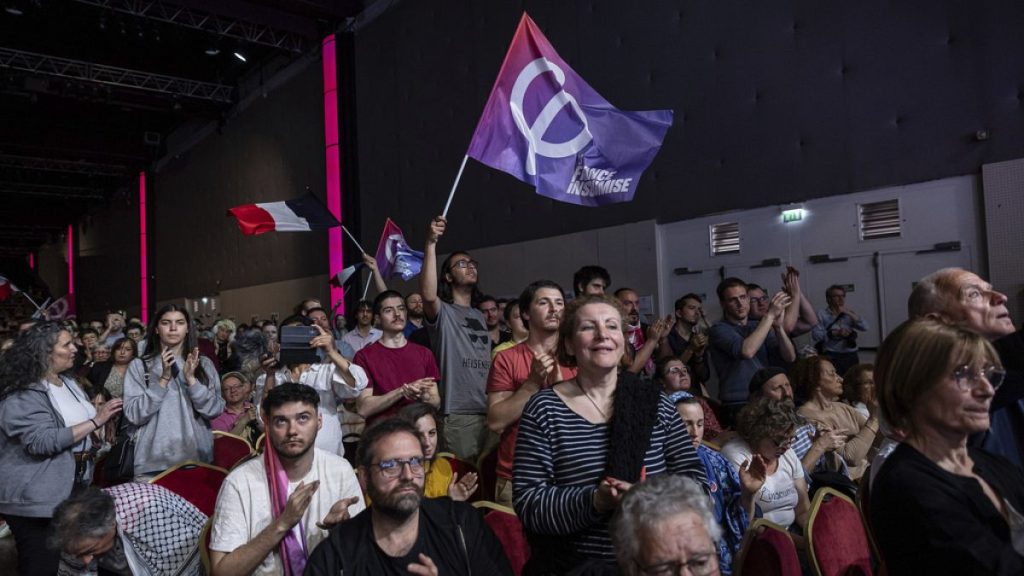France’s far-left LFI party, led by Jean-Luc Mélenchon, called for the official recognition of Palestinian statehood at a rally in Aubervilliers near Paris ahead of the European elections. Mélenchon emphasized the need for France to take a stand and recognize Palestine, stating that the world should condemn what he referred to as a genocide. LFI candidate Manon Aubry also expressed intentions to pursue sanctions against Israel and stop arms shipments to the country if their party is elected. This call for recognition comes amidst global criticism of Israel’s military offensive in Gaza, with Spain, Ireland, and Norway officially announcing their recognition of the Palestinian state as well.
The symbolic move by Spain, Ireland, and Norway to formally recognize the Palestinian state comes as a result of months of negotiations between European countries willing to take this step. The concept of a two-state solution, proposed by the UN in 1947, aims to create separate nations for Jews (Israel) and Palestinians (Palestine) to coexist peacefully and independently. However, Israel opposes this solution, stating that it may lead to increased instability in the Middle East. Despite the opposition from Israel, 139 out of 193 UN member states have recognized Palestinian statehood. The European elections are scheduled from June 6-9, with 720 lawmakers being elected across the 27-member European Union for the next five years. France will begin voting on June 9.
The timing of these calls for recognition of Palestinian statehood by France’s far-left LFI party aligns with the final weeks of campaigning for the 2024 European elections. Mélenchon’s strong stance on the issue reflects a growing sentiment among some European nations to challenge the status quo and address the ongoing conflict in the region. By emphasizing the need for France to officially acknowledge Palestine, the party aims to send a message of solidarity with the Palestinian people in the face of Israeli military actions in Gaza. Manon Aubry’s commitment to pursuing sanctions against Israel if elected further underscores the party’s determination to take a stand on this issue.
The mounting global condemnation of Israel’s actions in Gaza has prompted several European countries to take a decisive step towards recognizing the Palestinian state. As the discussion around the two-state solution continues to evolve, more nations are considering the implications of formally acknowledging Palestine. The move by Spain, Ireland, and Norway sets a significant precedent for other countries to follow suit and express solidarity with the Palestinian cause. Despite Israel’s objections, the momentum towards recognizing Palestinian statehood is gaining traction among UN member states and could lead to further diplomatic shifts in the future.
The debate over Palestinian statehood and the two-state solution remains a contentious issue with significant geopolitical implications. As more European nations consider recognizing Palestine, the dynamics of the conflict in the region are likely to shift. The European elections provide an opportunity for politicians like Jean-Luc Mélenchon and Manon Aubry to advocate for a more assertive stance on Palestinian rights and challenge the status quo. By calling for sanctions against Israel and an end to arms shipments, the LFI party is positioning itself as a vocal advocate for Palestinian statehood and raising awareness about the ongoing human rights violations in the region. The outcomes of the European elections will be crucial in determining the future direction of Europe’s approach to the Israeli-Palestinian conflict.
In conclusion, the push for recognizing Palestinian statehood by France’s far-left LFI party reflects a broader trend towards challenging the status quo and advocating for a more proactive stance on the Israeli-Palestinian conflict. The symbolic move by Spain, Ireland, and Norway to formally recognize Palestine underscores the increasing international pressure on Israel to address the plight of the Palestinian people. As the European elections approach, the debate over the two-state solution and Palestinian rights is likely to remain a defining issue for politicians and policymakers across the continent. The outcomes of the elections will have important implications for the future of European foreign policy and its approach to resolving the longstanding conflict in the Middle East.













